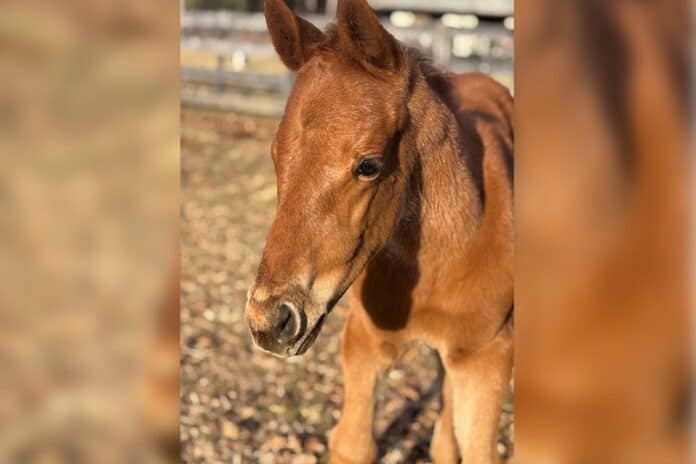If you know anything about horse racing you will have heard of American Pharoah, a celebrated and prolific winner of major races, including all three legs of the Triple Crown and the Breeder Cup Classic in 2015.
The greatly anticipated arrival of a foal by American Pharoah was tempered by the mare Philanthropic’s checkered foaling history.
Philanthropic, an 8-year-old thoroughbred mare owned by Ann Mudge Backer of Smitten Farm in The Plains, Virginia, was referred to the Marion duPont Scott Equine Medical Center (EMC) by veterinarian Christine Adams on Feb. 1, to foal out under hospital care and supervision.
The EMC in Leesburg is one of three animal healthcare facilities and teaching hospitals of the Virginia-Maryland College of Veterinary Medicine, which is based at the Virginia Tech main campus, in Blacksburg.
Past pregnancies had proven problematic for Philanthropic, with one foal being stillborn in the field after no warning signs of labor. She successfully gave birth to her second foal, who was healthy and is now in race training. Two years ago, again, with no obvious signs that labor was about to begin, she experienced dystocia on day 355 of her pregnancy. Typical gestation in horses is about 340 days (about 11 months).
Dystocia is a difficult birth during which the foal cannot be delivered naturally. Typically, dystocia is due to abnormal positioning of the foal within the birth canal, but can be caused by fetal abnormalities, uterine issues, or other complications.
When Philanthropic arrived at Leesburg, she was bright and alert, behaving normally, and showed no signs of undue distress. She had minimal udder development. Fetal ultrasound showed an active fetus with a normal heart rate.
It is always hoped that every pregnant mare entrusted into the care of Virginia Tech’s Leesurg equine center gives birth without a hitch, and thankfully, Philanthropic needed little assistance during the birth of her healthy foal. The chestnut filly was born in the early hours of the morning, on day 344 of gestation.
“Watching a foal take its first breath makes every sleepless night worth it,” said Krista Estell, clinical associate professor of equine medicine.
But Philanthropic was not going to make things go too smoothly. She refused to let her newborn filly nurse.

Mom and foal were moved to a stall with an attached foal box to allow for separation of mare and foal to keep the foal safe. The filly was fitted with a feeding tube and received the all-important colostrum collected from her dam.
Colostrum is vital to the health of a neonate foal due to the essential antibodies it contains that cannot be produced by the foal itself right after birth. If a foal does not receive colostrum during a short window after birth, they may suffer from failure of transfer of passive immunity, putting the foal at risk for infection and other complications.
Philanthropic was given a hormonal medication to encourage her natural maternal instincts to kick in. Once successfully reintroduced to her mother, the filly initially required some assistance to nurse but quickly and reliably latched on without further assistance.
Much to Backer’s delight, mare and foal returned to Smitten Farm with instructions for continued close monitoring during a few days of rest before small paddock turnout.
“Philanthropic and her filly by American Pharoah are doing great!” said Hunter Marek, Smitten Farm manager
Look out for this little redhead in the future – she has exceptionally large hooves to fill.
By Sharon Peart


